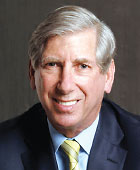The Dangerous Case of Donald Trump (St. Martin’s Press, 2017) was recently published with great fanfare and much attention. The book consists of 24 chapters, most of which offer clinical opinions of President Trump. It was edited by a Yale psychiatrist, Bandy Lee, M.D., and a group of psychiatrists, analysts, and therapists.
While I can certainly understand how concerned citizens would react to Mr. Trump’s unconventional and often offensive behavior by expressing their discomfort and disapproval, it is not acceptable for psychiatrists to publicly proclaim diagnoses and proffer clinical opinions of the POTUS, as this violates a key principle of psychiatry and our professional ethics.
Because I’m on record supporting adherence to the Goldwater Rule (see https://tonic.vice.com/en_us/contributor/jeffrey-a-lieberman-md), I was accorded the dubious honor of debating the authors on the evening of October 16 in the Uris Auditorium of the Weil-Cornell Medical College. I accepted with no small degree of ambivalence, knowing that the audience of mental health professionals would likely not be sympathetic to my position. Yet it is this position, which I firmly believe, that APA has espoused, not because it is a stodgy, establishment organization, but because it is advocating principled and responsible professional conduct.
I began my remarks with a disclaimer of sorts, revealing that I had been an advisor to Secretary Clinton’s campaign for mental health policy and contributed to her mental health agenda. I was present at the Javits Center on election night for what we all expected to be a historic celebratory event. Seated next to the stage, I witnessed the euphoric and optimistic throng metamorphose into a funereal experience as the results poured in, shattering hopes of what might have been.
Since then, I have been among the many who are shocked and saddened by President Trump’s behavior and can well understand the impulse toward protest and activism that motivated Dr. Lee and her colleagues to formally express their views in this book. However, as a physician and psychiatrist, I cannot condone and must strongly criticize these actions as unprofessional, unethical, and irresponsible.
I embrace the First Amendment and subscribe to Voltaire’s famous quote: “I disapprove of what you say, but I will defend to the death your right to say it.” However, the matter of Donald Trump’s mental status is different from the Vietnam War, the civil rights movement, or abortion rights in which physicians have historically expressed their strong support for social justice. In opining on the POTUS’s mental health, we are using our professional credentials to express a medical opinion when we have neither the right nor the evidence to do so.
Psychiatry’s history is marked by too many missteps in the past to allow itself to be drawn into an exercise of political partisanship, disguised as patriotism, that risks eroding the credibility of our profession. We have infamously been involved, unwittingly or knowingly, in human rights abuses in countries across the world when the definitions of mental disease were manipulated to include political dissidents and civil disobedience. Such instances are too numerous to summarize in this article, but among the most egregious were the collusion of psychiatry in the crimes of eugenics in Nazi Germany and political repression of the Soviet Union. We must be aware that psychiatry possesses a greater capacity for abuse than other medical specialties because it can be exploited to bypass standard legal and governmental procedures for establishing guilt, innocence, or competence and ostensibly legitimizes political action, even incarceration, without the odium ordinarily attached to such political conflicts.
The constitutional mechanisms for removing a sitting president from office consist of elections, impeachment, and the 25th Amendment of the Constitution. Elections reflect the will of the people; impeachment applies when the POTUS may have committed “crimes and misdemeanors,” and the 25th Amendment pertains to questions of presidential competence and consists of four sections.
•
Section 1 applies when a president is impeached from office, dies, or resigns, and then the vice president becomes president. The best-known example is Richard Nixon’s resignation and Gerald Ford’s succession as POTUS.
•
Section 2 applies when the vice president dies or resigns, as Spiro Agnew did when faced with charges of corruption.
•
Section 3 provides for the voluntary transfer of power by the president to the vice president when he/she is, or will be, incapacitated, such as when Reagan was shot, and other presidents have undergone medical procedures involving general anesthesia (even routine colonoscopies). When they regain capacity, presidential authority is transferred back to them.
•
Section 4 has never been invoked. It allows the vice president, together with a “majority of either the principal officers of the executive departments [cabinet secretaries] or of such other body as Congress may by law provide,” to declare the president “unable to discharge the powers and duties of his office” by submitting a written declaration to the president pro tempore of the Senate and the speaker of the House of Representatives. In such instances, the vice president becomes acting president. Section 4 is meant to be invoked should the president’s incapacitation prevent him from discharging his duties, but he is unable or unwilling to provide the written declaration as called for by Section 3. When this is done, Congress has 21 days to decide the issue of competence and need for change.
In such a scenario, physicians and particularly psychiatrists almost certainly need to have a role. But their (our) role is not to initiate—that is done through the Constitutional mechanisms—it is to assist in the process as needed. To take clinical potshots and lob diagnostic grenades at the POTUS through the media is not the optimal course of action. To do so is to engage in partisan tabloid psychiatry, which harms our profession. Sadly, The Dangerous Case of Donald Trump is not a serious, scholarly, civic-minded work, but simply tawdry, indulgent, fatuous, tabloid psychiatry.
As citizens and psychiatrists, we are entitled to express our opinions of the POTUS as a First Amendment right. However, when we draw on our credentials as physicians to render a clinical diagnosis with insuffient information and under unconducive circumstances as grounds for removal from office, we cross a boundary into an unprofessional, unethical, and perilous realm. Even though we may feel stirred to what may seem patriotic action, as were our colonial forebears, by Thomas Paine’s immortal words, “These are the times that try men’s souls,” we should do well to remember two quotes by oratorical geniuses: “Discretion is the better part of valor” (Falstaff in Henry IV) by William Shakespeare and Samuel Johnson’s rueful quote some years later, “Patriotism is the last refuge of the scoundrel.” On such occasions, our best course of action is to exercise professional discipline and the forbearance to allow the constitutionally prescribed mechanisms to do as they were intended and in due course. ■
A discussion of APA’s ethics guideline known as the Goldwater Rule can be accessed
here.

